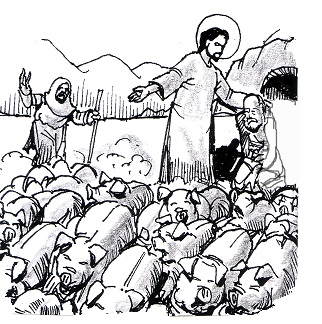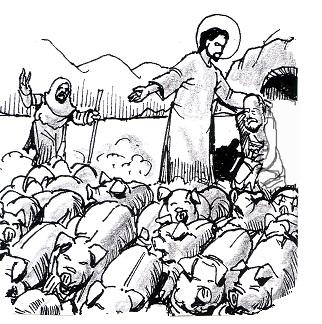

“They begged Jesus to leave their district” (Matt 8:34).
Amos 5”14-15, 21-24; Matt 8:28-34
Whenever Jesus crossed the Sea of Galilee with his disciples, they found themselves in the area called the Decapolis, a borderland of ten cities east of Palestine established and administered by the Romans. Gadara was one of the cities, and Jesus encountered the two demoniacs there, living in the cemetery among the tombs and terrorizing the neighborhood. The demons recognized Jesus’ authority and begged to be cast into a large herd of swine.
The details of the story demonstrate Jesus’ Lordship even over the occupying Romans and the pagan regions they controlled. The swine, considered unclean by Jews, were perhaps being raised for export to Rome, so when Jesus casts them into the sea he was striking at the interests of the Roman Empire, a provocation to both its imperial control and theological pretensions regarding the divinity of the emperor and the superiority of Roman religion.
What is most striking about the story is that when Jesus comes with the power to liberate its people by driving out evil spirits, they beg him to leave their district. They are in the grip of the religious and economic benefits of imperial control. They reject the redemptive offer of Jesus for fear of losing those benefits and incurring Roman disfavor. Matthew’s story is presented as a miracle story, but its intent must have been clear to those who could decode the challenge to Rome. In Mark’s account, the demons identify themselves as “Legion,” a military allusion (5:1-20).
Our distance in time from the context of the early church can make us forget the dangers of preaching liberation and values out of step with the dominant culture. The Gospel has consequences. Jesus did not die for preaching love and the early church was not persecuted for keeping to itself. Jesus was executed as a dangerous subversive and the church was attacked for refusing civic allegiance by offering incense to Roman gods. It was scapegoated as a visible community of outliers who modeled a different society in which their pacifism and faith in Jesus raised suspicions and offended public sensibilities.
Discipleship challenges us to be out of step when normalcy means indifference to inequality or remaining silent in the face of injustice to minorities or those at the margins of society. The core of the Gospel is not just the creed and the catechism, but a checklist of attitudes and actions described clearly in the Beatitudes (Matt 5) and the Corporal Works of Mercy (Matt 25). For living these we will be recognized as followers of Jesus.
Advertisement







